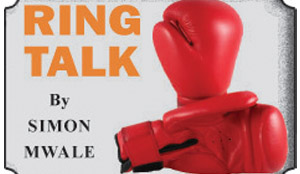 LAST week’s piece titled “Will Muziyo Turn Pro After Games?” has attracted reactions from readers.
LAST week’s piece titled “Will Muziyo Turn Pro After Games?” has attracted reactions from readers.
I said then: “After being in the amateur ranks since 2005, will he (Muziyo) consider turning professional and provide the excitement in the middleweight division? Will professional boxing stables be looking at him without trying to lure him and nurture him into a world champion?”
I said nine years in the unpaid ranks was too long for him to ply his trade in a younger man’s sport and that if he had to compete at the highest level, maybe time was ripe for Muziyo to make a career defining decision now.
“The Commonwealth Games, like the Olympic Games, are a good launch pad for boxers with ambitions to compete at the highest level as professionals. Amir Khan, Floyd Mayweather Jr and Lennox Lewis are some of the marquee fighters who graduated from amateur to professional after excelling at the Games,” I added.
The first reaction came from someone who called in from Mufulira, I think, whose name I can’t recall as I misplaced the piece of paper on which I scribbled his name. My sincere apologies to the caller.
The caller, however, hailed the column saying it was contributing to the development of the sport and cited the appeal made in the article for the Zambian fighter to consider turning pro after minting a bronze medal at the recent Commonwealth Games in Glasgow, Scotland, as proof of what he meant.
The caller said Muziyo should now aim for the stars and consider the amateur ranks a closed chapter, especially that he’d achieved a medal for himself and Zambia. Thank you, caller for your kind words.
And Kennedy Mufukama of Lusaka wrote: “Hi, long time. (I’ve) just read your bit on Muziyo bronze (medal) winner. Now having not watched him, I’m depending on your hindsight regarding him turning pro.”
Kennedy agreed with me that time had come for the boxer to go for what he described as “real combat and trade leather for a buck” (in the pro ranks.)
Kennedy, however, warned that the medal could make or break his (Muziyo’s) pro career and “that’s why he needs to be handled, trained and managed by pros.” He concludes his remarks with a challenge to this writer. “…do we have them (managers) in boxing today? Maybe you have the answer. Have a good day.”
Well, Kennedy, to answer your question, I think Zambia is not in short supply of capable, experienced and dedicated managers or handlers. If anything, the country has a shortage of quality boxers to be managed by the pool of promoters, managers and trainers even though there are few stables.
Another point, managers need not necessarily be past boxers themselves; (remember Ali-Angelo Dundee?). What they need is an in-depth understanding and a passion for the sport.
Some of the best and successful managers we have today never entered a ring.
I think the biggest problem the sport faces, like others in Zambia, is the question of corporate sponsorship. If a boxer is talented and sponsors come on board, the sky should really be the limit for such a boxer.
And Freelance journalist, Kalumiana Kalumiana, was also impressed with the column and he wrote: “Hi, boss, great column today. I’ve sent you an email (to my yahoo address which I could not receive until I’d to open a Gmail account).
In his delayed mail, Kalumiana pointed out omissions of past medal winners at the Commonwealth and Olympic Games. He wrote: .” I have been reading your great column in the August 2 edition and I noticed you left out the medal winners from the 1978 Edmonton
Commonwealth Games where, I think, we had the biggest medal haul by Zambia in the ring at the Commonwealth Games.
“John Sichula won silver after losing to Azumah (Nelson) in the bantamweight category, Francis Musankabala won silver in the flyweight division, while Teddy Makofi (welterweight) and Enock
Chama (middleweight) won bronze each. Ba Lucky Mutale reached the last eight.” I thank Kalumiana for adding value to the column by setting the record straight.
Comments: mwale.simon@yahoo.co.uk / 0966 755 574/0953744074






